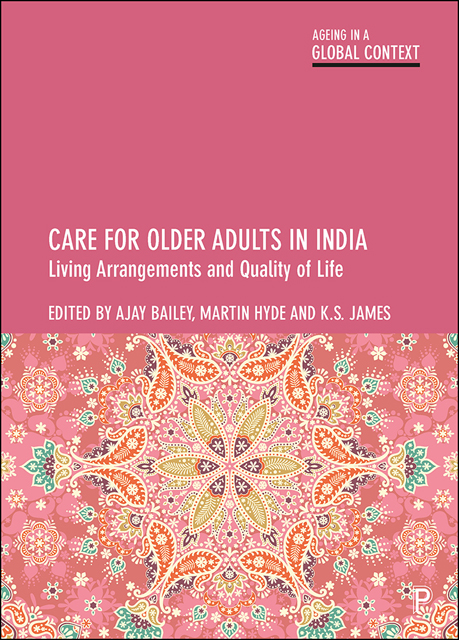Book contents
- Frontmatter
- Contents
- List of figures and tables
- Notes on the editors
- List of contributors
- Acknowledgements
- Series editors’ preface
- Map of India
- 1 Introduction: Living arrangements and care in India
- 2 Theorising care and relationships in the age of migration
- 3 Emerging living arrangements of older adults in India: patterns and welfare implications
- 4 Living arrangement concordance and the well-being of older persons in India
- 5 Family size and living arrangements among older adults in Kerala: panel data analysis, 2004– 19
- 6 Care arrangements for older adults: exploring the intergenerational contract in emigrant households of Goa, India
- 7 All my responsibilities towards my children are over! Linked lives and life course obligations among older adults with migrant children in India
- 8 Interpreting the landscapes of care for older men in Delhi and Kolkata: perspectives from care receivers and caregivers
- 9 The role of cultural meaning system and place attachment in retaining home ownership while residing in retirement homes in Kerala, India
- 10 Decision-making and choice or sine qua non? Care home entry in Tamil Nadu
- 11 Welfare and development programmes for older adults in India
- 12 Lessons and future directions for caregiving research in India
- Index
4 - Living arrangement concordance and the well-being of older persons in India
Published online by Cambridge University Press: 13 October 2022
- Frontmatter
- Contents
- List of figures and tables
- Notes on the editors
- List of contributors
- Acknowledgements
- Series editors’ preface
- Map of India
- 1 Introduction: Living arrangements and care in India
- 2 Theorising care and relationships in the age of migration
- 3 Emerging living arrangements of older adults in India: patterns and welfare implications
- 4 Living arrangement concordance and the well-being of older persons in India
- 5 Family size and living arrangements among older adults in Kerala: panel data analysis, 2004– 19
- 6 Care arrangements for older adults: exploring the intergenerational contract in emigrant households of Goa, India
- 7 All my responsibilities towards my children are over! Linked lives and life course obligations among older adults with migrant children in India
- 8 Interpreting the landscapes of care for older men in Delhi and Kolkata: perspectives from care receivers and caregivers
- 9 The role of cultural meaning system and place attachment in retaining home ownership while residing in retirement homes in Kerala, India
- 10 Decision-making and choice or sine qua non? Care home entry in Tamil Nadu
- 11 Welfare and development programmes for older adults in India
- 12 Lessons and future directions for caregiving research in India
- Index
Summary
Introduction
It has been postulated that individuals are more likely to experience control and a sense of positive adjustment when their abilities, resources and needs are in consonance with the demands of the environment. If older adults live in an environment of their preference and choice, it is expected that they will have more positive attitudes towards life, greater capabilities for adjustment and improved realisation of welfare among them as compared with others who cannot abide in environments they prefer (Wahl and Gersdorf, 2020). This should also hold true for living arrangements, for example, if older adults have the sort of living arrangements that they want, they should have better health and well-being than if they did not. However, as of 2022, there is relatively little research on the living arrangement concordance (the correspondence between the actual and preferred living arrangement) among the older adults in lower-and middle-income countries. This chapter seeks to redress that by exploring living arrangement concordance and the well-being of older adults in India.
The Congruence Theory of Person-Environment Fit, drawn from Lewin's (1935, 1951) field theory, postulates that behaviour (B) is a function of the person (P) and the (psychosocial) environment (E), expressed as B=f(P, E). This assumes that behavioural outcomes result from interaction between individuals and their environment and a good fit typically results in positive outcomes for the individual (Edwards, 1991; Kristof, 1996). At its core, fit theory holds that individuals seek environments that match best with their unique personal attributes in accordance with their individual differences in attributes. It also argues that the alignment between a person's characteristics and their environment results in positive outcomes and the individual often strives to maximise concordance between needs and environment (Kahana, 1975; Kahana et al, 1980). Conversely, Festinger (1957) proposed that people holding inconsistent beliefs, termed as dissonant cognitions, experience an unpleasant tension-state. Hence, they are constantly motivated to reduce or resolve this inconsistency. Furthermore, fit theory holds that both a deficiency (wherein the environmental attributes become less than the personal attributes) and an excess (wherein the environmental attributes become greater than the personal attributes) are harmful for individuals at extreme levels as not getting what one greatly desires is as detrimental as getting what one detests (van Vianen, 2018).
- Type
- Chapter
- Information
- Care for Older Adults in IndiaLiving Arrangements and Quality of Life, pp. 43 - 68Publisher: Bristol University PressPrint publication year: 2022
- 1
- Cited by



